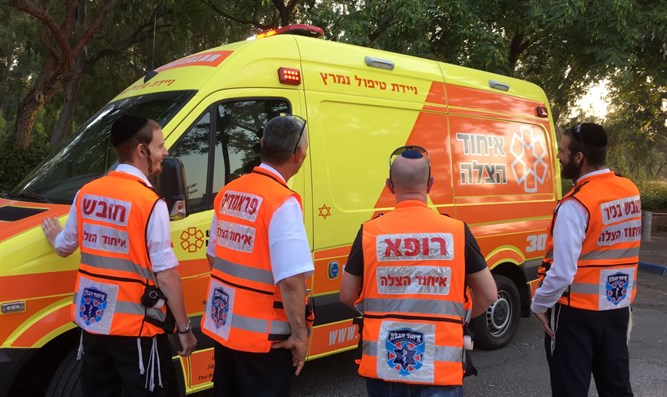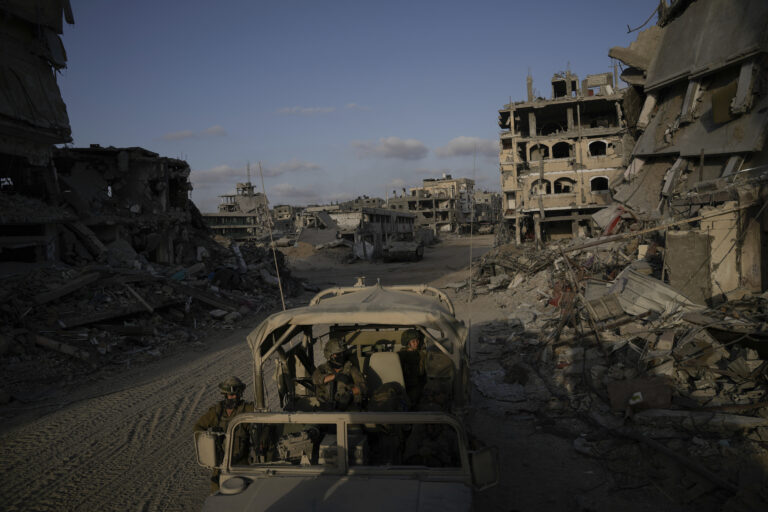United Hatzalah (UH) of Israel has joined together with the new ambulance organization United Ambulance of Israel (UAI), in an effort to double the pre-hospital transport care for patients in Israel. The new organization aims to be competition for Magen David Adom’s national ambulance service in an effort to break the monopoly on transporting patients to the hospital.
On Sunday morning the two organizations kicked off their new project which hopes to get all of the private ambulance companies to participate enabling them to transport patients suffering a medical emergency to the hospital. According to a statement made by the fledgling organization, the current number of private ambulances in Israel is approximately 600, which is roughly the same size as the active fleet of MDA ambulances in service at any given time.
“The program we launched today is designed to counter the ridiculous situation that 600 private ambulances, which can save lives, are unaware that there are sick, injured and dying people a few meters away,” said Moshe Teitelbaum, the CEO of United Hatzalah, who unveiled it on Sunday at a Tel Aviv press conference along with Effi Feldman, the head the new UAI.
The CEO of UAI Efraim Feldman added that the new arrangement will also provide a much-needed boost to the availability of emergency response ambulances available during wartime. “During any war or conflict the new fleet of private ambulances will double the total amount of ambulances operated by Israel’s national ambulance service and will fill in the gaps that are often left by the current system allowing for the patient to reach the hospital faster by receiving transport from whichever ambulance arrives on the scene first.”
The private ambulances will be connected to the dispatch and command center of United Hatzalah (UH) which will be able to know their exact location and dispatch the closest ambulance to an emergency regardless of which company the ambulance is from. MDA ambulances will also continue to be notified about emergencies that are called into the UH dispatch.
Patients who call UH’s emergency number of 1221 to get help, may be transported by UH ambulances if those ambulances are nearby and available, in which case the transport would be completely free. If UH ambulances are not nearby the person’s location, then the nearest UAI ambulance will be dispatched. Feldman estimated that the price of a private ambulance in an emergency would be 5% to 20% cheaper than an MDA ambulance depending on the variables of the scenario.
The partnership between the two organizations will allow for citizens to receive treatment and transport by private ambulances in addition to MDA. “For years we have witnessed situations in which Israel’s national ambulance service did not have enough vehicles or teams available to provide transport to patients suffering a medical emergency. Often transport was slow if available at all. At the same time, private ambulances were in the vicinity of these patients who needed assistance, but the ambulance teams did not know about the emergency,” said Teitelbaum.
“In April 2017, a three-year-old child in Kiryat Gat choked on sand that he had swallowed. MDA took more than 30 minutes to arrive and the child died. However, less than three minutes away from the daycare where the child was located stood a private intensive care ambulance with its team. Had this team of professionals known about the incident then they could have arrived at the child’s side in three minutes and provided emergency care and the young child’s life might have been saved. This situation is not logical in any way. Therefore our primary goal is to notify these private ambulances about medical emergencies in their vicinity in order to assist people in need of help, wherever they may be. This will be done by using United Hatzalah’s dispatch center hotline of 1221,” Teitelbaum added.
Feldman added that: “Currently, more than 30 percent of all of the private ambulances in Israel have been activated using United Hatzalah’s advanced GPS technology and Lifecompass 2.0 program. The command center can now see where these ambulances are and dispatch them in real time based on who is closest to the incident.”
A second goal of the program is to minimize the number of instances in which people need help but hesitate to call an ambulance due to the prohibitive price attached with an ambulance transport currently in Israel. “Our command center will be dispatching private ambulances, whose price is significantly lower than that of Israel’s National Ambulance Service at the number *8170 to anyone who needs an ambulance service in a non-emergency situation. Citizens can order ambulance services such as patient transfer, return trips from the hospital, the transport of deceased persons and other services, at a lower rate than the current cost today. The average costs of the private ambulances that we work with will be cheaper and make ordering an ambulance cheaper for all citizens. The price recommendations are being finalized in the next few days and will be published shortly.”
Feldman emphasized that: “Over the years, there has never been a single body that could represent the various private ambulances in Israel, of which there are more than 100, and the people who operate them. In spite of the fact that these are all companies who work in the same field, there exists an imbalance between the way they are treated and the way that MDA is treated. We are also working to solve this imbalance. United Ambulance of Israel will now represent all of the companies that join together underneath our umbrella and represent their interests to Israel’s Health Ministry, the various HMO’s in the country and in all regulatory matters. This will free up the staff and owners to operate in a far more efficient manner and provide better quality service to the patients.”
As reported by the Jerusalem Post, “retired Israel Police superintendent David Krause, who served as a member of the Tadmor Committee, which examined the state of emergency medical services and first aid in Israel. Among the committee’s conclusions was that a way must be found to include the 600 private ambulances in Israel in the national effort during routine and emergency situations in order to provide solutions for the sick and injured. Today, following the launch of the 600 + 600 program, Krause said: “I welcome the program that actually implements the conclusions of the Tadmor Committee and will improve the treatment of civilians in need of urgent medical assistance.””
Additionally, one of Israel’s leading trauma doctors who works as the head of the Trauma Center at Hadassah University Medical Center Prof. Avi Rivkind, welcomed the launch of the 600 + 600 program. “This significant increase in ambulances will shorten the time it takes to reach the sick and injured and will save many civilians’ lives.” Rivkind himself volunteers with UH.
(YWN Israel Desk – Jerusalem)












One Response
Quality care or regulation never meant much to ichud.
What matters is image and press releases, and glory in the name of saving lives.
The public will suffer from this ballagan.